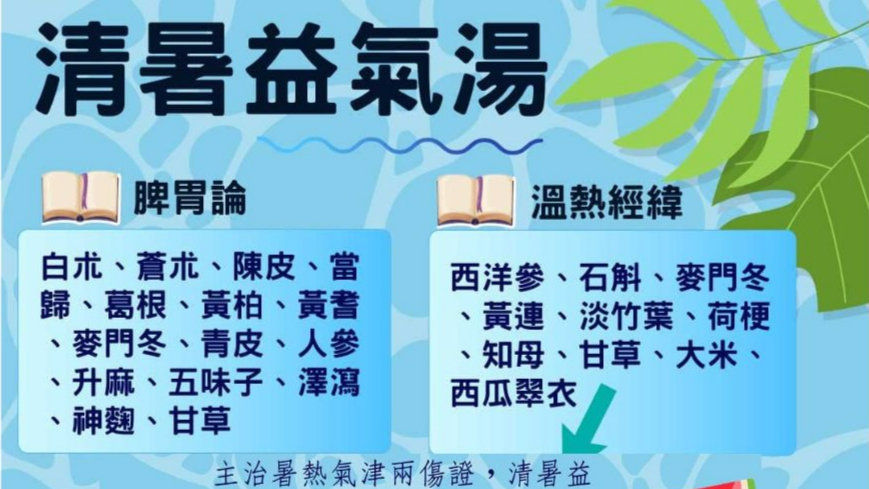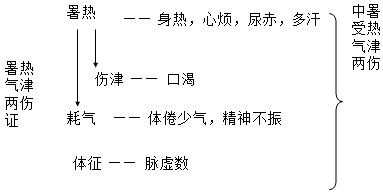Qing Shu Yi Qi Tang: Two TCM Formulas for Relieving Summer Heat
- Hongji Medical

- Jun 2, 2025
- 4 min read
Qing Shu Yi Qi Tang, or Clear Summer Heat and Boost Qi Decoction, refers to two distinct formulas in Traditional Chinese Medicine (TCM), each crafted to tackle summer heat-related illnesses. Developed by Li Dongyuan in the Jin-Yuan period and Wang Mengying in the Qing Dynasty, these formulas showcase TCM’s tailored approach to treating different manifestations of heat-related conditions.
Historical Context
Li Dongyuan’s Qing Shu Yi Qi Tang
During the Jin-Yuan period, social unrest and poor nutrition weakened people’s spleen and stomach, leading to frequent qi deficiency and damp-heat issues in summer. Li Dongyuan created his formula to strengthen the spleen, boost qi, and clear damp-heat, addressing symptoms like fatigue and digestive discomfort caused by summer heat.
Wang Mengying’s Qing Shu Yi Qi Tang
In the more prosperous Qing Dynasty, excessive heat and sweating from summer activities often depleted body fluids and qi. Wang Mengying designed his formula to cool the body, nourish yin, and replenish fluids, targeting symptoms like thirst and irritability due to heat-induced qi and yin deficiency.

Formula Composition and Roles
Each version of Qing Shu Yi Qi Tang uses unique herbs, organized by the TCM principle of “monarch, minister, assistant, and envoy”:
Li Dongyuan’s Qing Shu Yi Qi Tang
Monarch: Astragalus (Huang Qi)Boosts qi, strengthens the body’s surface, and promotes vitality.
Ministers: Ginseng (Ren Shen) and Atractylodes (Bai Zhu)Enhance qi and support spleen function to improve digestion and qi production.
Assistants: Cang Zhu, Alisma (Ze Xie), Medicated Leaven (Shen Qu), Green Tangerine Peel (Qing Pi), and Tangerine Peel (Chen Pi)Cang Zhu and Alisma clear dampness, while Shen Qu, Qing Pi, and Chen Pi regulate qi and digestion to remove internal dampness.
Envoys: Ophiopogon (Mai Dong), Schisandra (Wu Wei Zi), Angelica Sinensis (Dang Gui), and Honey-Fried Licorice (Zhi Gan Cao)Ophiopogon and Schisandra nourish yin and fluids, Angelica Sinensis supports blood, and Licorice harmonizes the formula.
Wang Mengying’s Qing Shu Yi Qi Tang
Monarch: American Ginseng (Xi Yang Shen)Boosts qi, nourishes yin, clears heat, and generates fluids.
Ministers: Dendrobium (Shi Hu) and Ophiopogon (Mai Dong)Nourish yin, clear heat, and hydrate to relieve fluid loss from heat.
Assistants: Coptis (Huang Lian), Bamboo Leaf (Zhu Ye), Lotus Leaf (He Ye), and Anemarrhena (Zhi Mu)Coptis clears heat and dampness, Bamboo Leaf cools the heart, Lotus Leaf clears summer heat, and Anemarrhena nourishes yin and reduces heat.
Envoys: Licorice (Gan Cao), Non-Glutinous Rice (Jing Mi), and Watermelon Rind (Xi Gua Cui Yi)Licorice harmonizes, Rice supports the stomach, and Watermelon Rind clears heat and quenches thirst.

Pathophysiology
The two formulas address different summer heat-related conditions, reflecting TCM’s focus on individualized treatment:
Li Dongyuan’s Qing Shu Yi Qi Tang: Qi Deficiency with Damp-Heat
In the Jin-Yuan period, poor diet and overexertion weakened the spleen, impairing digestion and causing dampness buildup. Summer heat worsened this, leading to:
Spleen Qi Deficiency: Weak digestion causes fatigue, low energy, and poor appetite.
Internal Dampness: Spleen dysfunction leads to dampness, causing chest stuffiness, nausea, and poor appetite.
Damp-Heat Accumulation: Heat combines with dampness, resulting in bloating, loose stools, and scanty, dark urine.
This formula strengthens the spleen, boosts qi, and clears damp-heat.
Wang Mengying’s Qing Shu Yi Qi Tang: Qi and Yin Deficiency with Heat
In the Qing Dynasty, intense heat and sweating depleted fluids and qi, causing:
Fluid Depletion: Heat consumes fluids, leading to dry mouth, thirst, and irritability.
Qi Deficiency: Fluid loss weakens qi, causing fatigue and low energy.
Heart Disturbance: Heat affects the heart, leading to restlessness and insomnia.
This formula clears heat, nourishes yin, and restores fluids.
Indications and Benefits
Li Dongyuan’s Qing Shu Yi Qi Tang
Benefits: Boosts qi, strengthens the spleen, clears heat, removes dampness, and restores qi flow.
Indications: Summer heat with spleen qi deficiency, showing as fever, headache, fatigue, low energy, thirst, sweating, poor appetite, loose stools, chest stuffiness, nausea, or scanty, dark urine.
Wang Mengying’s Qing Shu Yi Qi Tang
Benefits: Clears heat, nourishes yin, generates fluids, quenches thirst, and supports the stomach.
Indications: Summer heat with qi and yin deficiency, showing as fever, thirst, irritability, fatigue, dry mouth, dry tongue, and a weak, rapid pulse.
Modern Applications
Both versions of Qing Shu Yi Qi Tang are widely used in modern TCM:
Li Dongyuan’s Qing Shu Yi Qi Tang
Treats summer colds and heatstroke, especially in those with weak digestion or spleen deficiency.
Useful for chronic fatigue syndrome or postpartum weakness when qi deficiency and damp-heat are present.
Wang Mengying’s Qing Shu Yi Qi Tang
Manages high fever and dehydration from summer heat, particularly for those who sweat heavily from outdoor work or exercise.
Helps with conditions like diabetes or hyperthyroidism causing thirst and excessive drinking, when qi and yin deficiency are diagnosed.
Precautions for Use
Pattern Differentiation: A TCM practitioner must diagnose the condition to select the appropriate formula, ensuring it matches the patient’s symptoms and constitution.
Constitution Considerations:
Li Dongyuan’s formula is slightly warm and should be used cautiously in those with yin deficiency and excess heat.
Wang Mengying’s formula is cooling and should be avoided in those with cold constitutions.
Professional Guidance: Always consult a qualified TCM practitioner for proper use.
Conclusion
Qing Shu Yi Qi Tang, with its two distinct formulas, highlights TCM’s brilliance in addressing summer heat through tailored treatments. Li Dongyuan’s version strengthens the spleen and clears damp-heat, while Wang Mengying’s nourishes yin and quenches thirst. By matching the formula to the patient’s condition, these remedies relieve symptoms like fatigue, thirst, and digestive issues, embodying TCM’s holistic wisdom. Consult a TCM practitioner to choose the right formula for a cool, healthy summer.




